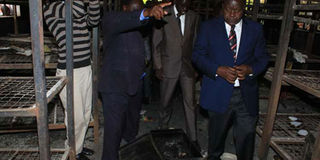Matiang'i orders schools to talk to students to stop unrest

Education Cabinet Secretary Fred Matiang'i and his Principal Secretary Belio Kipsang (centre) inspect one of the seven dormitories torched by students at the Itierio Boys High School on June 27, 2016. PHOTO | BENSON MOMANYI | NATION MEDIA
What you need to know:
Cabinet Secretary Fred Matiang’i directed that school managers should use the meetings to listen to grievances the students could be having.
Dr Matiang'i maintained that no government resources would be used to repair schools burned down by students.
An education lobby group Elimu Yetu Coalition said students involved in school unrest and wanton destruction of properties should be prosecuted.
The Ministry of Education has now directed schools’ boards of management (BOM) to hold meetings in their respective schools within the next seven days to assure students of their safety as a students’ unrest wave continues to hit the country.
In an attempt to contain the situation that is getting out of hand, Dr Matiang’i also asked management boards in affected schools to carry out thorough investigations and ensure that students found culpable are prosecuted.
“Those under 18 years should be prosecuted in juvenile courts,” the Education CS said.
Dr Matiang’i maintained that no government resources would be used in repairing or restoring schools burned down by students.
“The cost of repairs and restoration of damaged school property will be met by parents of the affected schools,” said Dr Matiang’i.
He added that transfer of students from one school to another must be sanctioned by the Sub-County Director of Education and the case applies to both public and private schools.
“Clearance for transfer will only be granted by principals after the affected students have cleared all fees, fines or losses incurred by students in their current schools,” said the CS in a statement on Wednesday.
He observed that the fire outbreaks have caused destruction of property and loss of huge amounts of resources in affected schools.
Dr Matiang’i added that during his recent inspection of schools affected by the unrest, he held several meetings with key stakeholders including members of Parliament, boards of management, head teachers and parents.
“It is unfortunate that this trend has become almost a culture which must, however, be eliminated,” said the CS.
He said in the past the government set up task forces in 2001 and 2008 to enquire into the causes of student unrests and made recommendations which it continues to progressively implement.
“I would like to assure our stakeholders that the ministry, in conjunction with relevant organs of government, is addressing the unrests. Investigations are ongoing to nap the culprits,” said Dr Matiang’i.
He assured parents of the safety of their children in schools, but urged them to exercise their parental responsibility accordingly.
The CS also called on all stakeholders ensure that schools enjoy conducive teaching and learning environments and avoid all activities that may derail the smooth management of schools.
“The government will continue to provide capacity development of school managers to manage disasters and emergencies whenever they occur,” said Dr Matiang’i.
At the same time, an education lobby group Elimu Yetu Coalition said students involved in school unrest and wanton destruction of properties should be prosecuted.
The lobby’s co-ordinator Ms Janet Muthoni said the persistent strikes being witnessed in the country resulted from lack of action against perpetrators of such actions.
“We have juvenile jails in this country where students with criminal records can be kept. We do not want to see children involved in burning of schools walking freely while those involved in petty crimes are cooling their feet in prison,” said Ms Muthoni.
She said punishing of offenders will send a clear message to other students and parents who are using them to fight management of schools.
Experts in the education sector have also pointed a finger at lack of conversation between the management of schools and students.
Dr John Mugo, a director Twaweza East Africa, an education lobby group said that school leadership in the country is to blame for the unrest.
“Schools managers have no space to talk to students. The current guiding and counselling system in place are not working as those tasked with the responsibility have no capacity,” said Dr Mugo.
He went on: “We have to come up with alternate behaviour management techniques in schools. Corporal punishment was abolished yet we have lived without an alternative. Expelling students is not a solution.”
Dr Mugo said even though mock examinations have also been cited as a reason for the unrest , teachers should look at a system that will help the students reduce the anxiety related to it.
(Editing by Joel Muinde)





